| Srl | Item |
| 1 |
ID:
137446
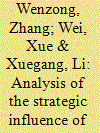

|
|
|
| 2 |
ID:
121489
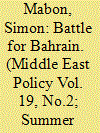

|
|
|
| 3 |
ID:
147249
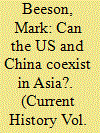

|
|
|
|
|
| Summary/Abstract |
The absence of effective regional institutions means that the geopolitical competition between the United States and China is likely to play out without the constraining influence such organizations can provide
|
|
|
|
|
|
|
|
|
|
|
|
|
|
|
|
| 4 |
ID:
131416
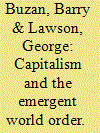

|
|
|
|
|
| Publication |
2014.
|
| Summary/Abstract |
The two-centuries-old hegemony of the West is coming to an end. The 'revolutions of modernity' that fuelled the rise of the West are now accessible to all states. As a consequence, the power gap that developed during the nineteenth century and which served as the foundation for a core-periphery international order is closing. The result is a shift from a world of 'centred globalism' to one of 'decentred globalism'. At the same time, as power is becoming more diffuse, the degree of ideological difference among the leading powers is shrinking. Indeed, because all Great Powers in the contemporary world are in some form capitalist, the ideological bandwidth of the emerging international order is narrower than it has been for a century. The question is whether this relative ideological homogeneity will generate geo-economic or geopolitical competition among the four main modes of capitalist governance: liberal democratic, social democratic, competitive authoritarian and state bureaucratic. This article assesses the strengths and weaknesses of these four modes of capitalist governance, and probes the main contours of inter-capitalist competition. Will the political differences between democratic and authoritarian capitalists override their shared interests or be mediated by them? Will there be conflicting capitalisms as there were in the early part of the twentieth century? Or will the contemporary world see the development of some kind of concert of capitalist powers? A world of politically differentiated capitalisms is likely to be with us for some time. As such, a central task facing policy-makers is to ensure that geo-economic competition takes place without generating geopolitical conflict.
|
|
|
|
|
|
|
|
|
|
|
|
|
|
|
|
| 5 |
ID:
157547
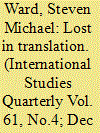

|
|
|
|
|
| Summary/Abstract |
Chinese and Russian foreign policy, in part, reflects both countries’ ambitions for higher status in the international system. This implies a critical question: can accommodating these ambitions prevent, or even reverse, the turn toward geopolitically competitive grand strategies by Moscow and Beijing? In other words, might accommodation lead them to channel their efforts in more benign directions? The dominant framework for analyzing the ways in which states seek status—a framework rooted in the insights of Social Identity Theory (SIT)—suggests that the answer is yes: status-seekers will most likely turn toward geopolitically competitive strategies when they face apparently “impermeable” obstacles to their ambitions. I argue that this framework depends on a “mistranslation” of SIT. Properly translated, the theory tells us little about the consequences of persistent status denial for international politics. Instead, it implies that status-seeking will resolve into geopolitical competition when, first, participants view geopolitically significant resources as markers of status and, second, when leaders believe that they can successfully change the distribution of status. I use analyses of two prominent cases that should prove friendly ground for the conventional translation of SIT—Germany before World War I and Imperial Japan—to demonstrate the serious problems that plague the framework favored by international relations scholars, especially with respect to its central claim about the link between persistent status denial and geopolitical competition.
|
|
|
|
|
|
|
|
|
|
|
|
|
|
|
|
| 6 |
ID:
129596
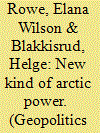

|
|
|
|
|
| Publication |
2014.
|
| Summary/Abstract |
The aim of this article is to examine what the geopolitics of the Arctic look like as seen from the largest Arctic state. How are narratives about the development of the region received, reworked and produced in a Russian context? We find that Russian policy actors distance themselves from discourses of Arctic conflict and geopolitical competition, and examine how this approach may serve some of Russia's key interests in the region. We further argue that the key tension in the Arctic region is not along the conflict/cooperation axis, but rather lies in the tricky process of delineating between international cooperation and national sovereignty in tackling Arctic problems. In attempting to illustrate the various voices, ideas and interests that shape Russia's policy understanding of the Arctic and its challenges and opportunities, we draw upon a media analysis and a set of qualitative interviews with representatives of the five Arctic states.
|
|
|
|
|
|
|
|
|
|
|
|
|
|
|
|
| 7 |
ID:
179185
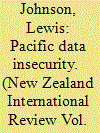

|
|
|
|
|
| Summary/Abstract |
Growing internet proliferation, data production and geopolitical competition in the Pacific region are increasing the vulnerability of Pacific Islands nations to foreign interference methodologies. Although no solution can completely eradicate the threat of foreign interference, reinforcing a nation's democratic institutions can make it a harder target to manipulate, and bolster its democracy. The relationship between data exploitation, foreign interference and national security; data privacy and protection legislation; possible changes to New Zealand's regional development outlook - all are matters of current concern. A wave of new data protection and privacy legislation is sweeping the globe, and the Pacific cannot be left behind.
|
|
|
|
|
|
|
|
|
|
|
|
|
|
|
|
| 8 |
ID:
150552
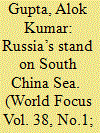

|
|
|
|
|
| Summary/Abstract |
South China Sea (SCS) conflict since July 2016 has been in international media spotlight quite frequently. Many experts of international politics are of the opinion that this dispute is fast turning into a hotbed of international politics. Some have been addressing it as a dispute with potentials to become flashpoint of another world war. China’s assertions and expansionist approach towards the SCS has invited protest by many of the small and big countries of the world.
|
|
|
|
|
|
|
|
|
|
|
|
|
|
|
|
| 9 |
ID:
189762
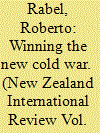

|
|
|
|
|
| Summary/Abstract |
Intensified geopolitical competition between great powers has led many to suggest a new Cold War is unfolding, with unavoidable repercussions for other states and the world order. There are three key questions relating to this development: Why has a kind of new Cold War arisen? How does this Cold War 2.0 resemble and (more importantly) differ from the old one? Having ultimately prevailed in the 20th century Cold War, what lessons can democracies draw from that experience? To survive the new kind of Cold War that is taking shape and even emerge the better for it, diversity must be acknowledged and managed.
|
|
|
|
|
|
|
|
|
|
|
|
|
|
|
|